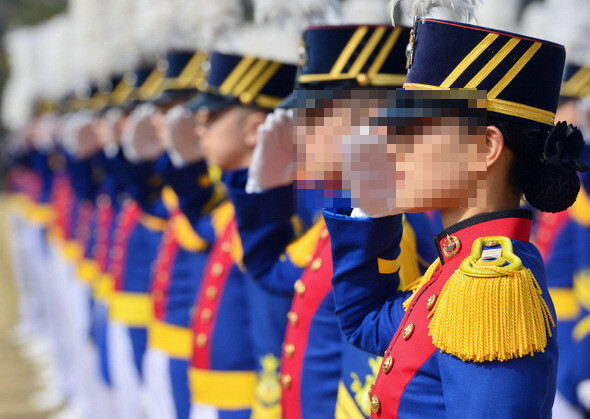hankyoreh
Links to other country sites 다른 나라 사이트 링크
Military criticized for making things tougher on female soldiers

By Ha Eo-young, staff reporter
The South Korean military and its academies are adopting systemic changes that are disadvantageous to women, as female cadets are earning top scores in the previous internal rating systems.
The changes are being criticized as symptoms of a deep-rooted male chauvinist culture.
The Korea Army Academy (KAA) adopted a new system this year with different weighting for various areas of performance. Previously, cadets were scored out of a total of 196 points without weighting, earning up to 146 points for general academic performance, 24 points for military studies and training, six points for athletics, and 20 points for discipline.
But the new system assigns greater weight to categories where male cadets typically perform highly, with weighted scores for military studies and training, athletics, and discipline. Indeed, the three areas will account for 34 percentage points more in the final scoring total, with military studies and training rising from 12% to 25%, athletics from 3% to 17%, and discipline from 10% to 17%.
Meanwhile, general academics, the area where female cadets tend to perform strongest, drops from 74% all the way down to 42%.
The changes could be attributable to the fact that female cadets finished at the head of the KAA class in both 2012 and 2013. (The valedictorian for 2014 has yet to be announced.) Cadets at the academy receive serial numbers by grade at graduation.
The KAA responded to the charges of sexism with a statement issued on Feb. 23. “The reason for the improvements to the grade calculation standards has to do with the excessive weight assigned to general academics in the previous system,” the statement said.
“The new system was introduced after a year of research, with aim of strengthening the KAA’s goal of training officers who combine intellectual capabilities with military caliber,” it continued, adding that the previous system “will be used for this year’s graduates, and the new system will not be applied retroactively for grades received through last year.”
The Army adopted a new system in June 2013 that does not assign rankings by school. This came after Reserve Officers’ Training Corps (ROTC) cadets at women’s universities outperformed other schools in military training evaluations.
At the time, the Army said it was doing away with the ranking to “prevent disharmony” among cadets and introducing a three-tiered assessment with scores of “excellent,” “good,” and “average.”
But sources said the real reason had to do with ROTCs from Sookmyung Women’s University taking first among around 100 universities at the 2012 summer exercises, and Sungshin Women’s University following it up in the 2012-13 winter exercises.
The Korea Air Force Academy faced its own charges of sexism when it attempted to give the Prime Minister’s Award - equivalent to second place honors - to the top-ranked cadet, who was female. After some controversy over gender discrimination, the cadet in question was ultimately given the first place President’s Award.
After the decision was made at a Feb. 20 review, the KAFA announced that it would revise its regulations so that senior officers could not arbitrarily change the awardees.
“It’s been 40 years since the Women’s Army Corps was established, yet you still don’t find any women as division commanders or in other command positions,” said Lim Tae-hoon, director of the Military Human Rights Center of Korea. “The male-centered military inner circle felt threatened as female cadets started coming out with excellent scores in recent years.”
“They need to be asking whether all of this doesn’t stem from the misguided notion that women can’t be accepted as commanders,” Lim added.
Please direct questions or comments to [english@hani.co.kr]

Editorial・opinion
![[Guest essay] The real reason Korea’s new right wants to dub Rhee a founding father [Guest essay] The real reason Korea’s new right wants to dub Rhee a founding father](https://flexible.img.hani.co.kr/flexible/normal/500/300/imgdb/original/2024/0423/8317138574257878.jpg) [Guest essay] The real reason Korea’s new right wants to dub Rhee a founding father
[Guest essay] The real reason Korea’s new right wants to dub Rhee a founding father![[Column] ‘Choson’: Is it time we start referring to N. Korea in its own terms? [Column] ‘Choson’: Is it time we start referring to N. Korea in its own terms?](https://flexible.img.hani.co.kr/flexible/normal/500/300/imgdb/original/2024/0423/3617138579390322.jpg) [Column] ‘Choson’: Is it time we start referring to N. Korea in its own terms?
[Column] ‘Choson’: Is it time we start referring to N. Korea in its own terms?- [Editorial] Japan’s rewriting of history with Korea has gone too far
- [Column] The president’s questionable capacity for dialogue
- [Column] Are chaebol firms just pizza pies for families to divvy up as they please?
- [Column] Has Korea, too, crossed the Rubicon on China?
- [Correspondent’s column] In Japan’s alliance with US, echoes of its past alliances with UK
- [Editorial] Does Yoon think the Korean public is wrong?
- [Editorial] As it bolsters its alliance with US, Japan must be accountable for past
- [Guest essay] Amending the Constitution is Yoon’s key to leaving office in public’s good graces
Most viewed articles
- 1[Guest essay] The real reason Korea’s new right wants to dub Rhee a founding father
- 2[Column] ‘Choson’: Is it time we start referring to N. Korea in its own terms?
- 3Why Korea shouldn’t welcome Japan’s newly beefed up defense cooperation with US
- 4Terry Anderson, AP reporter who informed world of massacre in Gwangju, dies at 76
- 5[Column] The clock is ticking for Korea’s first lady
- 6[Editorial] Japan’s rewriting of history with Korea has gone too far
- 7Opposition calls Yoon’s chief of staff appointment a ‘slap in the face’
- 8Senior doctors cut hours, prepare to resign as government refuses to scrap medical reform plan
- 9[Column] The president’s questionable capacity for dialogue
- 10Video evidence surfaces showing Korean comfort women were massacred by Japanese military